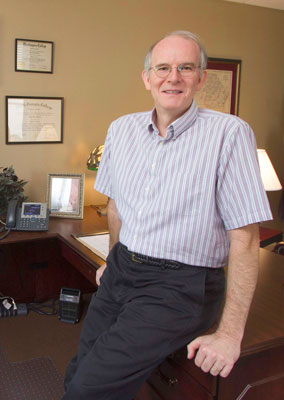August 22, 2014
14-254
Dr. David Williams: Faculty Excellence for Professional Activity

|
| Dr. David Williams |
VALDOSTA – Valdosta State University presented Dr. David Williams, professor of history, with the 2014 Faculty Excellence Award for Professional Activity during the university’s fall convocation.
Williams has served the university for 26 years and has since published 10 books, written more than 32 peer-reviewed articles, and presented at several conferences. Two of his books have been nominated for the Pulitzer Prize in History.
“Dr. Williams is probably the most prolific scholar of his generation at Valdosta State,” said Dr. Paul Riggs, professor and head of the Department of History.
For Williams, his professional activity is inspired by his desire to see his students thrive academically.
“A driving force behind my research and writing is to ensure that my students are not as ignorant as I was coming out of college,” Williams said.
Williams has established himself as an expert on the social history of the Civil War.
“I focus so much on the social history because not a lot has been done on that part of the war,” Williams explained. “That part of history explains so much, but not that many people were really looking at it and that is evident in the textbooks. Most books have only focused on the military or the political part of the war.”
Williams added that understanding social factors that led to war as well as what happened on the home front in the North and South during the war are just as important as military and political aspects.
“While a few history books have mentioned that the Confederacy had a desertion rate of about two-thirds of its soldiers by 1864, they do not explain why this happened,” said Williams. “When you look at the social part of it, you realize that the South was producing more than enough cotton but not enough food. This led to a food shortage in the army and back home. Many soldiers were getting letters from their families saying they were starving so they would leave the army and return home.”
Williams’ research has also delved into the resistance of African-Americans, including conspiracies and revolts, during the war.
“When looking at the Civil War, it is important to acknowledge that the Confederacy fought a two-front war – one against the North and one against its own people,” Williams said.
The professor seeks to clear up misconceptions about black and white support of the war among those in the North and South.
“This information can be enlightening and even empowering – particularly for black southerners,” Williams explained. “Many of the African-Americans in my classes do not really know how much influence their ancestors had in bringing down the Confederacy and ending slavery. Basically if African-Americans had been contented to be slaves they might still be slaves. Once I get that idea into the heads of my black students, they are not as uncomfortable talking about it.”
Williams has found the information to be eye opening for white southerners in his classes as well.
“By looking at this part of history, they learn that many of their ancestors did not really support the Confederacy,” he said. “I think it definitely gives them a little bit of perspective when they learn that more than two-thirds of them deserted before the war was over and most opposed secession from the Union in the first place. It helps them understand that waving a Confederate flag does not necessarily honor their ancestors."
Williams said that his students often ask him why people rarely understand these aspects of Civil War history.
“While white southerners may not have been united behind the Confederacy, it does not mean that they did not support white supremacy,” he explained. “In the war's aftermath, a romanticized version of the Confederacy became synonymous with white supremacy, which made it easier to image that white southerners had been united behind the Confederacy. Similarly, white northerners ignored the contributions of African-Americans and romantically imagined that their ancestors went into war as abolitionists, which wasn’t the case either. If you want to honor your heritage, read some real history, not some romanticized image of it.”
When asked what VSU’s Faculty Excellence Award means to him, Williams replied, “It is a really nice honor. I have been here since 1988 and looking back it does not seem like it has been 26 years. That is because I enjoy what I do. This award is a very nice honor and I appreciate it very much.”
Williams, whose Georgia roots reach back to the 18th century, holds a bachelor’s degree in history and political science from North Georgia College, three master’s degrees, and a Doctor of Philosophy in history from Auburn University.
Williams is married to Teresa Crisp Williams, associate to the dean of The Graduate School at VSU. The couple enjoys doing research together, and in 2004, were presented with the Georgia Historical Records Advisory Board Award for Excellence in Research Using Archival Holdings for their book Plain Folk in a Rich Man’s War: Class and Dissent in Confederate Georgia (University Press of Florida, 2002). They co-authored the book with David Carlson, a former graduate student of Williams’ who is now a professor of history at Troy State University.
Williams’ two most recent books, I Freed Myself: African American Self-Emancipation in the Civil War Era (Cambridge University Press) and The Old South: A Brief History with Documents (Mercer University Press), were published earlier this year. For a complete list of Williams’ books, visit http://www.amazon.com/David-Williams/e/B003UUZNY0/ref=ntt_athr_dp_pel_pop_1 .
Newsroom
- Office of Communications Powell Hall West, Suite 1120
-
Mailing Address
1500 N. Patterson St.
Valdosta, GA 31698 - General VSU Information
- Phone: 229.333.5800
- Office of Communications
- Phone: 229.333.2163
- Phone: 229.333.5983